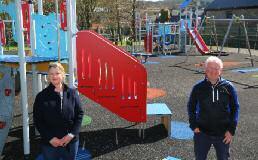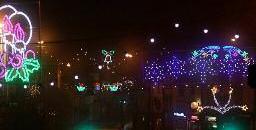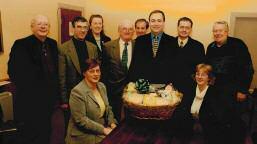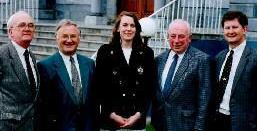
12 minute read
Community Development . . . . . . . . . . . . . . . . . . . . . . . . . . . . . . . . . . . . . . . . . . . . . . . . . . 20
Community Development
The new Playground in Kiskeam funded under the LEADER programme 2014-2020 which caters for children of all age groups Strength and Cognitive. Play teaches children social skills e.g. how to share fairly, to make new friends and to play as part of a group. Children are not the only ones who benefit from community playgrounds. The playgrounds have provided a relaxed space for parents and guardians to meet people living in their own local area. In addition, the playgrounds promote physical activity, encouraging children to exercise while disguising the physical activity as fun and games and setting the foundation for an active lifestyle as they become older.

Geraldine O’Leary and Denis Hickey of the Millstreet Playground Committee. Millstreet Playground was refurbished with the support of LEADER funding.
Community Elections

Bweeng Trail Blazers Athletic Club have successfully applied for LEADER Transitional Funding in relation to a feasibility study for the construction of a running track. Pictured representatives include Aidan Crowley, Deirdre Collins, Donal Collins, Brian Ahern and Michelle Geaney.

‘Lighting Up Macroom ’ Through the support of LEADER funding in the South Cork Area the town of Macroom benefitted from new Christmas lights in the year 2020. out of 25 seats with 2 seats each allocated to North Eastern, South Eastern, Western and the Mid Cork Area. Our company structure allows for such widespread representation and those interested are elected democratically through community elections. We would like to thank Mary Wallace for her term on the board representing South Eastern Duhallow and we welcome Geraldine O’Leary to the board from Millstreet.
Training for Community & Voluntary Groups
Through our work on the ground with community and voluntary groups across the region we have seen an increase in the number of active community groups in Duhallow. Governance and officer training is of paramount importance for new and current volunteers in their roles in the community. As the world of community development becomes ever more bureaucratic with more paperwork required it can be very off putting for new volunteers to be recruited and they need to be supported through this process. Funding applications, governance requirements, fundraising are all areas that committees need to navigate carefully. Our Community Development Working Group has recognised this need and has successfully been approved LEADER funding to deliver a training programme which will address governance issues, strategic planning, roles and responsibilities, funding applications, managing volunteers and facilitating meetings.
Growing Plants on a Budget
Living materials such as flowering plants, fruits, shrubs, trees, vegetables and herbs stimulates thought, exercises the body and encourages an awareness of the external environment.
There are many benefits to growing and planting; it can lower stress levels as natural environments have a calming influence, it is an inexpensive recreational activity that can encourage socialising and decrease isolation, it improves air quality, it is a therapeutic tool and being immersed in nature positively impacts mental health. Gardening activities offers a low-impact exercise which improves physical health. There is a positive correlation between the presence of green areas with plants, shrubs and trees and physical activity levels; people are much more likely to exercise in an aesthetically pleasing area.
From our work with disadvantaged communities over the years we have identified a number of initiatives in response to the issues affecting them; following on from face to face group consultation meetings with these communities, held the end of 2019, we identified a need for training in planting and growing. Community representatives took part in a 3 week online Growing Plants on a Budget course. This training will assist in maintaining the health and wellbeing of communities. Participants learned how to successfully grow new plants from seeds, divisions, stem and root cuttings; How to save and store seeds; Covering shrubs, trees, herbs, vegetables, fruit and house plants this course gave participants the confidence they need to grow plants and take care of them and in the process money.
Thomas Carmody Gneeveguilla GAA Development Officer and Stephen Crowley Club Chairperson outside Gneeveguilla Hall which received LEADER funding for the repair of its roof under the LEADER programme 2014-2020.
Pádraig O’ Briain preparing to facilitate the online “Growing Plants on a Budget” course.
30 Years of LEADER

This year, LEADER is celebrating 30 years since its inception. The LEADER programme (in French – Liaison Entre Actions de Développement de l'Économie Rurale – In English - Links between actions for the development of the rural economy) began as a European Commission initiative to Comhar LEADER na hÉireann delegation address rural decline and being hosted by Commissioner Padraig depopulation, as outlined by the then
Flynn in his Brussels office, Chairman Anthony Leddy Cavan Monaghan RIP, Commissioner Padraig Flynn, Mr Larry President Future of R Jacques ural Euro d pe e . Lores Its eth in os The was O’Neill Wicklow LEADER and Maura Walsh. simple but challenging to the status quo, LEADER, by engaging local communities, businesses and organisations to establish a Local Action Group to plan and take charge of their own futures in a Bottom-up approach by supporting a range of projects in their Natural Area of Development, right throughout Europe. IRD Duhallow was selected as one of the first 17 pilot groups in Ireland and has accessed all LEADER programmes since 1991. LEADER was so successful across Europe that it was given a key role in Pillar ll of the Common Agriculture Policy. LEADER has resulted in huge investment of €23m in grant aid and when coupled John Lougheed DG Agri, Maura Walsh IRD with private matching funds and the Duhallow, Gerhard Grosch Germany, Julio value of voluntary labour and Conde S & AEIDL. pain, EC/A Robert Luckash EIDL panel of ex Austria OAR perts Austria donations comes to over €40million, in 2001 introducing the Specific Features of Duhallow communities and business. LEADER. LEADER has contributed to creating a living countryside and has enhanced of quality of life of the people of Duhallow. For the application of LEADER II funding, IRD Duhallow developed its strategic aims which, for the first time looked at 4 thematic areas of development- Human Resources, Cultural Resources, Economic resources and the Environment. The strategic framework has served us well and still more than relevant now.
LEADER is defined by its 7 Specific Features: • Area-based: Natural Area of Development, small enough to be cohesive but large enough to allow development occur, not aligned to municipal or other political
boundaries. The IRD Duhallow LEADER territory fits this definition perfectly. • Bottom-up: Local people are the best experts to drive the development of their area. This bottom-up approach means that the local community and local players can help define a development pathway for their area consistent with their needs, expectations and plans. This bottom-up approach is enshrined in the EU regulations with provisions for animation and for decision making ensuring that no one interest group can have a majority. • Local Action Group. The people who were previously the passive 'beneficiaries ' of a policy become active partners and drivers of their area ' s development; this is a defining characteristic of Community-Led Local Development The involvement of local actors should be fair and transparent including the population at large, economic, civic and social interest groups and representative public and private institutions. The added value of this approach is associated with local empowerment through local strategy development, delivery and resource allocation. • Innovation: giving LAGs the flexibility to introduce new ideas and new methods, taking on new programmes to augment and address all aspects of development. • Integration: between economic, social, cultural and environmental actions, as Signing the LEADER II Contract, Minister distinct from sectoral
Jimmy Deenihan, Jerry Sheehan IRD development approaches. All Duhallow Chairman, Frank Healy Vice- LEADER themes and sub Chair Healy RIP, Department Inspe and Maura Walsh IRD ctor Oliver Duhallow. themes must be included. • Networking: enabling sharing and learning among people, organisations and institutions at local, regional, national and European levels. • Co-operation: among LEADER groups and other Actors, to share experiences, allow complementarity or to achieve critical mass. LEADER Cooperation is well recognised as an ideal tool to promote cohesion across rural Europe. This model has served rural areas across Europe well and in the case of Ireland, we were held up as the example of how LEADER should be implemented from LEADER 1 through to LEADER 07-13. IRD Duhallow, as an Irish Local Action Group was invited to the then preaccession countries, firstly Finland


The 1993 Executive Board of IRD Duhallow: Conor O'Flynn, Frank Healy, Jerry Sheehan, Michael Twohig and CEO Maura Walsh
Minister Eamon O Cuiv attends the IRD Duhallow LEADER conference with Board Members Don Crowley, Judy O Leary, Jack Roche & Michael Doyle and staff members Maura Walsh, Eileen Linehan and Mary McHugh.

30 Years of LEADER
and Austria then the Eastern European countries like Poland and the Czech Republic, and then Romania and Croatia as they too prepared to join the EU, to address public meetings and promote the LEADER concept and how it worked and was implemented in Ireland.
LEADER has contributed in a big way to the development of the Living Countryside concept, better known as The Cork Declaration which was adopted as European Policy during the 1994 Irish Presidency ’ s major Rural Development Conference. From community centres and recreation facilities to local walks and playgrounds, tourism accommodation to activity centres and cultural facilities, lifelong learning
and community development, as well as infrastructural projects like small and medium business set up and expansion, creating jobs and wealth to encourage people to remain, return, live and thrive in rural areas, LEADER has been the backbone of Rural Ireland and especially in Duhallow.
Much of the fabric of Duhallow life has been benefitted from LEADER. Every community has been supported to access LEADER and to develop the assets of their own areas. LEADER has been the catalyst to many other sources of funding for more specific thematic projects, for example, IRD Duhallow is the only LDC that has secured two LIFE programmes worth €5.5m specifically targeted at the Environment. Having a successful Local Action Group like IRD Duhallow has meant that a range of other programmes to address a diverse range of needs of the whole population, have been accessed and delivered in an integrated manner, adding value and accelerating the impact of both the new programmes and LEADER.
IRD Duhallow no longer enjoys the title of Local Action Group as that passed to the Local Authority LCDC’ s in 2015 under the Better Local Government policy in Ireland. We are now referred to as Local Development Companies and Implementing Partners of LEADER.
However, on this the 30th anniversary year of LEADER, it would be remiss not to highlight the importance of the programme with its bottom up approach, the Local Action Group grounded in the community, delivering in a natural area of development with an integrated, cooperative ethos. A programme that has the capacity to go way beyond the administration of the giving of a grant, but one that builds capacity within a community and social Capital in region, that recognises what the Carnegie Charter for Rural Development coined, Asset Based Community Development approach.
The aim of the initial LEADER programme 1991-1994 was to establish the Local Action Group as a local strategic development organisation; the second LEADER programme 1994 to 1998 had the theme of Innovation which, was to encourage the newly formed LAGs, fresh from the success of the pilot initiative, to take on new areas of work that they could stretch their capacity and integrate with, or compliment LEADER. For many of the Irish LAGs, this varied from the exchequer funded Social Inclusion programme to other EC Initiatives. The next iteration of LEADER (2000-2006) required us to have a Thematic approach to Development of our areas with actions cascading therefrom, IRD Duhallow chose Environment, as even back then we recognised that we had a real asset that could benefit our farmers and communities into the future. Our last strategic plan as an independent LEADER LAG (07-13) was themed on Sustainable Rural Development and our board, taking into account the feedback from community consultations chose four Strategic Pillars, Social, Cultural, Economic and Environment Development. This approach is ideally positioned to deliver on the European Commission ’ s Community Led Local Development Strategy.
LEADER 14-20
As has been well documented, the Irish Government took the decision for the 5th LEADER programme in Ireland, to change the delivery structure to one where the LAG or Local Action Group – would be a sub group of the Local Authority to be known as Local Community Development Committees. IRD Duhallow became an Implementing Partner of the three LAG’ s that cover our region, with the budget decimated by a 70% cut to the programme in Cork. As Implementing Partner, we did our best to navigate the lengthy timelines and deadlines between expressions of interest, application processes, evaluations and LAG meetings followed by the issue of contracts. We have supported communities to access the programme successfully across all themes and subthemes. 2020 was the final year of the programme and we fully committed our budget with many projects to be paid out in 2021.
We welcome the Transitional Programme funding put in place for January 2021 by Minister Humphries and expected to last until December 2022. It includes a Project as well as Administration budget to ensure communities and enterprises can continue to receive funding support.
President Mary McAleese opens Bruach Na Carriage in 1999 pictured with Jack Roche.

IRD Duhallow Evaluation Committee 2003, Mort O’ Connor Enterprise Ireland, Michael Manning and the Late Noel Dillon
CEO Maura Walsh with Secretary General Gerry Kearney at the Ploughing Championships in Tullamore.
Former Minister for Agriculture Michael Creed with Former IRD Duhallow Chair Mary Wallace at our Enterprise Awards.
Triona Dennehy with Former Minister Pat Ring Former Minister John O’Donoghue, with Former Taoiseach Bertie Aherne, John Sheahan, Maura Walsh and Cormac Collins.


